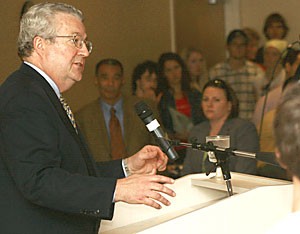John Hofmeister, president of Shell Oil, spoke about energy security in the United States and fielded questions from a standing room-only crowd in the Kiva Room of the Student Union Memorial Center yesterday afternoon.
Hofmeister’s visit is part of a 50-city tour titled “”A Dialogue with Americans on Energy Security,”” in which Shell hopes to converse with the American public about energy supplies and security.
Energy security since the 1990s has been more precarious than previous years, Hofmeister said.
Following the 2005 hurricane season, which included Hurricane Katrina, storms disrupted national energy networks and concerns of energy shortages in the United States were brought to the forefront, Hofmeister said.
Cheap and available fuel is important to a functioning, socially just society, he added, as the public needs access to transportation and energy to live.
“”The economic base of our society is predicated on available and affordable energy,”” Hofmeister said.
Shell has developed technology to produce oil from domestic sources as well as Canadian sources, he said. The technology creates natural gasses from coal in an environmentally responsible way. Shell also uses solar and wind technology, as well as hydrogen fuel cell technology, he added.
Another method Shell has undertaken for energy security is the management of greenhouse gases in the interest of global warming, which Hofmeister said Shell acknowledges as a fact.
“”When 90 percent of the world’s leaders or more, when most of the civilization, says we are worried about climate issues, who are we to say, ‘Well, let’s debate the issue.’ “”
Following the speech, the audience questioned Hofmeister about oil-extracting technology, Shell’s operations in Nigeria and the environment, among other subjects.
“”I think universities are ideal locations for engaging in this dialogue,”” said Ed Stiles, dean of the College of Engineering, who helped host Hofmeister and conducted meetings with Shell.
The question period was interrupted at one point by a loud comment from an audience member about Shell’s role in the international community, but then proceeded in an orderly manner.
Another audience member, Will Hodges from the Center for Biological Diversity, questioned Hofmeister about Shell’s offshore leases in Alaska, where oil reserves exist alongside fragile ecosystems and endangered species.
The Center for Biological Diversity, along with four other environmental advocacy groups and an Alaskan indigenous rights group, have filed a lawsuit that has successfully halted Shell exploratory drilling until the process can be reviewed.
“”You literally can’t fathom how important the environment is,”” Hodges said. “”It’s not just a national park that’s nice to look at out the window, it’s the underlying basis of our survival.””









